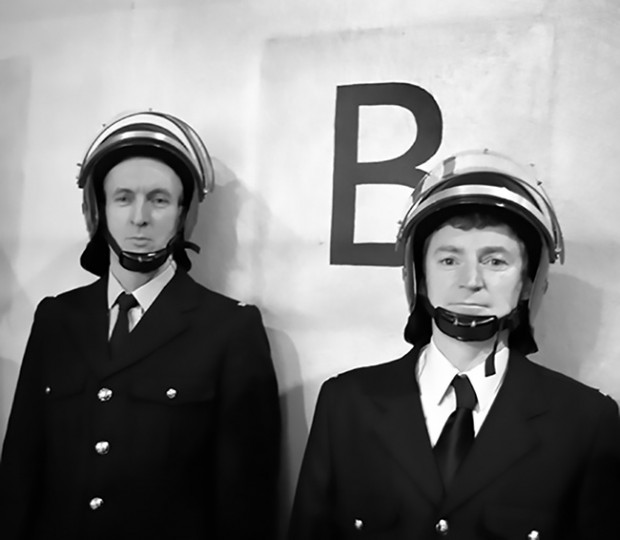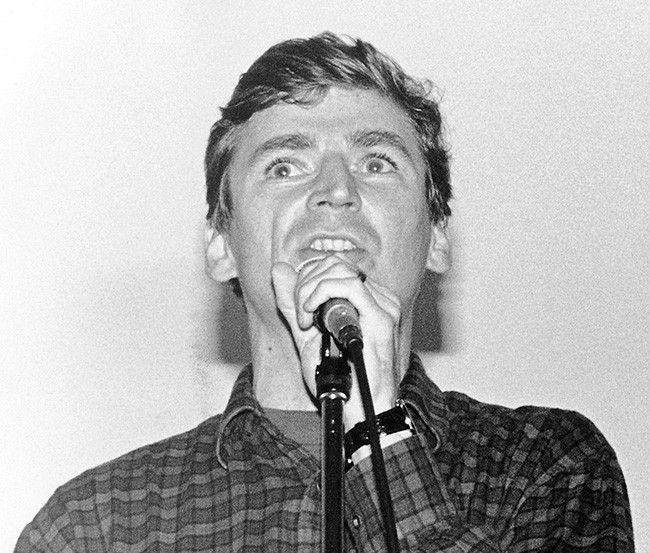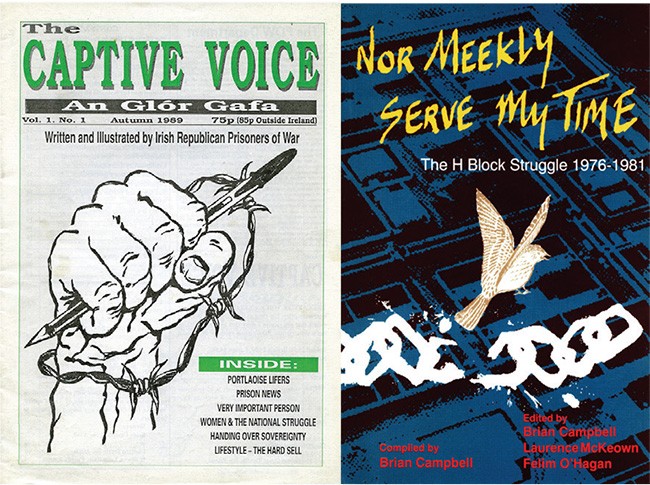1 December 2020 Edition
You’ll know what to write

• Laurence McKeown with Brian in a still from the feature film, H3
Brian Campbell was editor of An Phoblacht from 1996 to 1999. He came to the paper in 1995 as a Reviews editor. Brian died suddenly in 2005. Here, his long time writing collaborator Laurence McKeown gives a personal insight into Brian’s years of writing and political activism.
For Brian, politics was about more than dry theories. It had to be about the life of real people and expressed through art, satire, humour, personal narrative, and more

I first met Brian Campbell shortly after he arrived into the H-Blocks in the mid-1980s. Brian took to jail like a duck takes to water. He had access to political books and magazines, was immersed in a culture of political debate and discussion, and could play football daily in the yard. All that was missing was his friend, soulmate, and wife, Gráinne.
At that time, as a member of the IRA’s camp staff, I was in charge of our political education programme – a programme that was by then moving into a more cultural, creative, and artistic phase. Brian had both an interest and skill in writing and we just happened to be on the same wing together. It was the beginning of what was to become a very creative collaboration and lifelong friendship – though tragically that life was cut short so abruptly in 2005 when Brian died, aged just 45.
My first experience of Brian’s writing and editing skills was when we started poetry workshops. By coincidence, around that time typewriters were introduced to the prison, having become obsolete in the outside world with the arrival of computers and word processors.
Although it should not be the case, reading something in print can give it more credibility than reading the same words handwritten on a page. Brian and I decided, therefore, that we should produce a small magazine containing a selection of poems from the workshops. The outcome was, Scairt Amach (Shout Out), a few A4 pages which Brian typed up, using his customary one finger of each hand to strike the keys with. A friendly teacher photocopied the pages, stapled them into an A5 format, and we distributed the magazine around the camp.
The poetry workshops, in turn, gave rise to other literary endeavours which further expressed our desire to ‘have our own voice heard’. The most significant of those occurred in the autumn of 1989 when we established the magazine, wholly compiled and edited by prisoners, An Glór Gafa/The Captive Voice.
Brian was the ideal choice to become first editor of the magazine. In an interview I conducted with him years later for a doctoral thesis about the prison, he recalled; “I think some people may have seen it as being purely about politics and the argument I made, and I’m sure you made the same one, was that it had to be a variety; art work, politics, satire, and humour.”

And that’s the approach that Brian took in all his future works. For Brian, politics was about more than dry theories. It had to be about the life of real people and expressed through, art, satire, humour, personal narrative, and more. Nor Meekly Serve My Time: the H-Block Struggle 1976-1981, which Brian (clandestinely) compiled in the prison in 1989/1990, is based on personal narratives - narratives which contain many accounts of humour, pain, comradeship, and personal challenges faced.
When both of us were released from prison in the early 1990s, we collaborated on other creative projects; including the feature film, H3, the plays, The Laughter Of Our Children and A Cold House, produced by Dubbeljoint Theatre.
When he was appointed Editor of An Phoblacht in 1996, a position he held until 1999, he asked me to write a weekly column for the paper. I asked him what he wanted me to write about. He replied, “You’ll know what to write.”
He never questioned the content of my articles, but, of course, did challenge the writing. Brian despised redundant words or worn-out clichés. For him, each word had to have a reason for being on the page. Gentle by nature, he was rigid when it came to word excess, preferring brevity to make the intended point.
Brian was not one to make a dramatic entrance. Not the one at the meeting who raised his hand repeatedly to restate what several speakers before him had just said. He was the one you spoke to afterwards to see what thoughts he had on taking forward the outcome of the meeting, as he was sure to have them. And not just thoughts but notes too, because Brian always carried a pen and small notebook with him wherever he went.
Not one to make a dramatic entrance, his sudden departure from this world left me, and others who knew him, devasted. Because Brian grew on you; grew on you until one day you suddenly realised he is not just important to you, he has become an important part of you.




